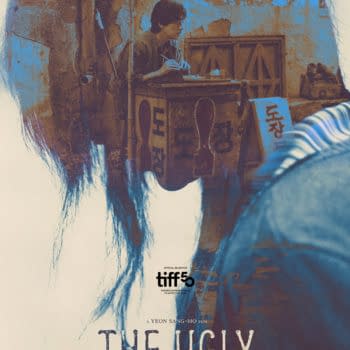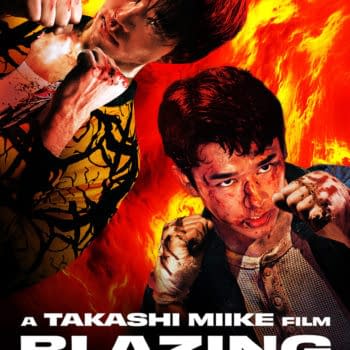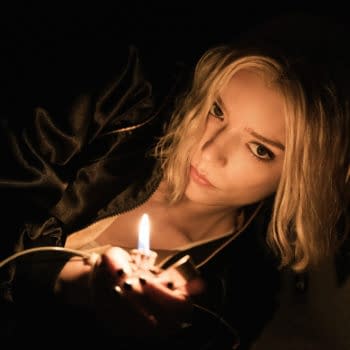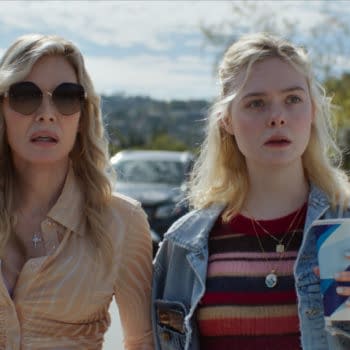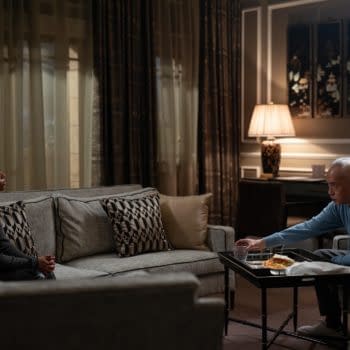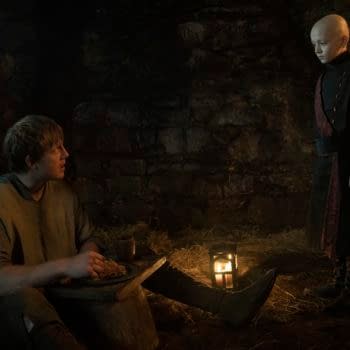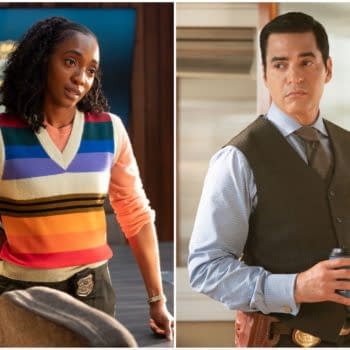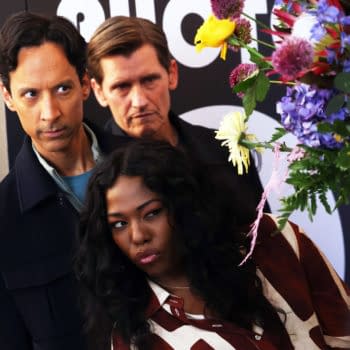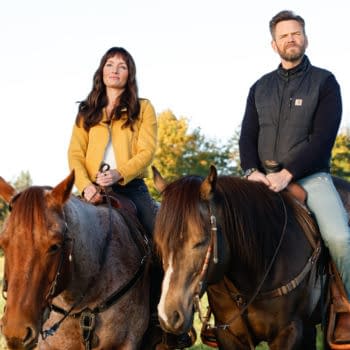Posted in: HBO, TV | Tagged: Audrey Niffenegger, bbc, doctor who, HBO, steven moffat, The Time Traveler’s Wife
The Time Traveler's Wife Plays Like Watered Down River Song Story Arc
Steven Moffat's TV adaptation of Audrey Niffenegger's bestselling novel The Time Traveler's Wife is an awkward thing, an artifact that may have come too late. The melancholy love story is about a woman (Rose Leslie) married to a man (Theo James) unstuck in Time who keeps disappearing and she only meets different versions of him from his timeline and has to live with knowing the end of their time together long in advance.
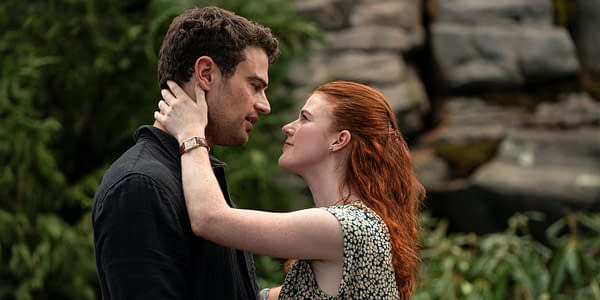
The art of adapting a book for film or television is about what to leave out. The movie version of The Time Traveler's Wife from 2009 left too much out to satisfy fans of the book. Moffat's TV adaptation has all the bad habits of TV and his own – he tries to inject levity into a melancholy and sad story with his signature soundbite wisecracks and jokes that don't always fit. He also devotes far too many scenes of Clare's childhood encounters with a naked older Henry (Theo James) to make it feel more awkward and creepy than the original story already was. The story could otherwise be read as an allegory for living with a husband with a terminal illness, of a woman married to a difficult man who's frequently absent, but in 2022, it's become overshadowed by the flaw of the time travel trope that everything is predestined and Clare really has no agency or say in whether she gets to be with Henry or not.
But we've been here before. Moffat has already told this story in all its flaws and messiness during his run on Doctor Who in the story of River Song.
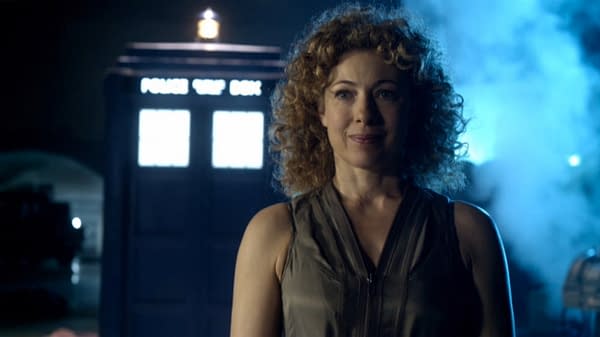
The Time Traveler's Wife actually came first. The book was published in 2003 and Moffat wrote "The Girl in the Fireplace" for Doctor Who in 2005. That was his first riff on the book in his love story between The Doctor and Madame de Pompadour in pre-Revolutionary France. It managed to elude the creepiness of the heroine meeting the man she fell in love with as a child because only one scene, and it was skillfully written to portray The Doctor as her imaginary friend who helps her scare off the monster under her bed. Moffat would repeat that theme when he took over as showrunner three years later when the newly-regenerated 11th Doctor (Matt Smith) meets Amy Pond (Karen Gillen) as a child and returns to her after she grows up. Then Moffat made one of his biggest missteps on the show when he has Amy try to shag the Doctor, seeming to forget that this was supposed to be a show for kids. Millions of viewers were creeped out.
Moffat went on to do an unofficial adaptation of The Time Traveler's Wife with the entire River Song storyline. He introduced her in 2008 in a two-parter when Russell T. Davies was the showrunner. And when Moffat took over the show in 2010, he pretty much lifted heavily from the book to intersperse River's long story with the Doctor that went all the way to his penultimate season in 2015. He riffed on the nonlinear love story where The Doctor and River met each other at wildly different parts of their timelines. He revealed that River (Alex Kingston) turned out to be Amy and Rory's daughter all along, so he'd known her since she was born. She was brainwashed by his enemies to assassinate him but falls in love with him instead. Fans were creeped out back then too. Moffat's work has a recurring theme of dynamic, smart women totally in love with and devoted to the hero, even when he's a jerk. It was present here in Doctor Who and it was in his hit sitcom Coupling and his flawed adaptation of Jekyll. To see that theme played out in his adaptation of The Time Traveler's Wife feels way too familiar.
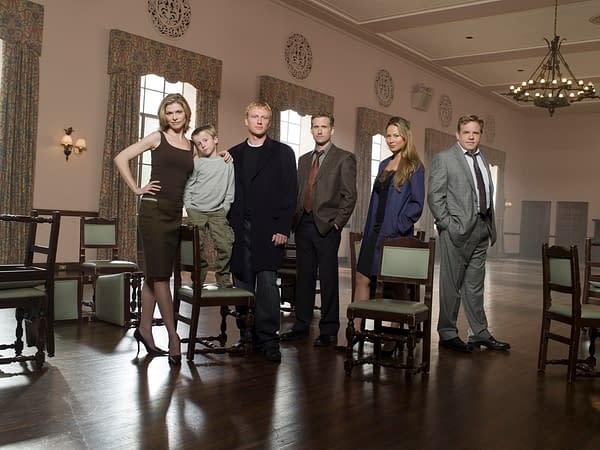
There was a good TV series "adaptation" of The Time Traveler's Wife back in 2007: an NBC show called Journeyman. That show starred Kevin McKidd as a reporter struggling to keep his marriage alive while he keeps blinking back in time to save someone's life. The show was a conflation of Niffenegger's novel – the part about the marriage – with Quantum Leap. The series only lasted 13 episodes before it got cancelled. At least it never revealed that McKidd popped back to the past to meet his wife as a kid. McKidd moved onto a prime gig on Grey's Anatomy immediately after the cancellation.
It seems the 2000s were the time for The Time Traveler's Wife. It was a bestseller and was on the minds of writers like Moffat and the writer's room of Journeyman and a few other projects during that decade. That was also when a movie adaptation was produced starring Eric Bana and Rachel McAdams. When you have so many unofficial adaptations of a popular book with the serial numbers filed off (some might call them "rip-offs" but who are we to say?), an actual TV adaptation of the book more than ten years later no longer feels fresh or surprising because its ideas, imagery, and themes have already been strip-mined more than a decade earlier. It even has that trope of the characters giving a mockumentary interview to the camera that died on US television at least five years ago. It's ironic that the movie adaptation came at the end of the 2000s after Moffat's riff on Doctor Who and NBC's Journeyman. The new TV adaptation feels dated as if time has passed it by. Are we the time travelers or is it the show, arriving at the wrong time in history? Only time (and ratings) will tell.



